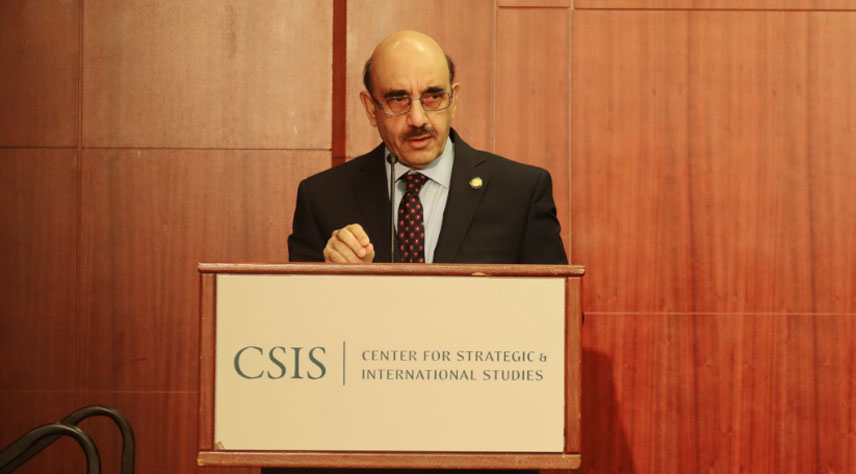WASHINGTON – Pakistan’s Ambassador to the United States, Masood Khan, has reiterated Pakistan’s unwavering commitment to further strengthen and promote bilateral relations with the United States, including security cooperation and people-to-people exchanges.
He was addressing at Center for Strategic and International Studies (CSIS) on “The Future of Pakistan and the U.S.-Pakistan Relations” in Washington DC.
The event was hosted by Senior Vice President CSIS Daniel Runde. Former Ambassador Robin Raphel gave her opening remarks.
Addressing a hybrid session, attended by members of the think tank community, former ambassadors and opinion makers and also viewed online by thousands of viewers, Masood Khan emphasized the significant strides made in fostering congruence between Pakistan and the United States over the past two years.
He emphasized the importance of bilateral trade, with the US being Pakistan’s largest single-country export destination, and highlighted successful engagements like the U.S.–Pakistan Trade and Investment Framework Agreement (TIFA) ministerial meeting.
Highlighting Pakistan’s economic potential, Ambassador Masood Khan pointed out that Pakistan ranks as the 24th largest economy by purchasing power parity (PPP) and is the fifth most populous country, with a youthful demographic where 64 percent are below the age of 30. He emphasized the nation’s tech-savvy populace and the rapid digitization of the economy.
Outlining Pakistan’s priorities, including wealth creation, human capital development, modernization of key sectors like agriculture and manufacturing, and preparation for climate change, he invited international partners to leverage Pakistan’s strategic economic position in West Asia, emphasizing ongoing structural economic reforms to capitalize on recent challenges as opportunities for growth and development.
He said Pakistan should be a meeting point, not a battleground for US and China. Both countries are most welcome to invest in Pakistan in the areas of their respective competencies and competitiveness.
Regarding investment opportunities in Pakistan, he highlighted Pakistan’s attractiveness for American investors, citing the presence of 80 American enterprises, including Fortune 500 companies, operating profitably in Pakistan across various sectors. He noted the burgeoning tech startup ecosystem, with significant investments in areas like fintech, healthtech, and Artificial Intelligence.
Highlighting the significance of newly constituted Special Investment Facilitation Council (SIFC), he said areas of direct interest to American investors would be IT, agriculture, energy and critical minerals. He said these four areas have been prioritized by the Special Investment Facilitation Council (SIFC) for fast-track foreign investment. He said Pakistan is sitting on a treasure trove of minerals. He said Pakistan has the largest reserves of copper, gold, lithium, rare earth elements, magnesium and cobalt. The Ambassador invited the investors to help extract these minerals and process them for industrial use along the value chains.
Talking about terrorism, Masood Khan quoted recent UN Analytical Support and Sanctions Monitoring Report, which has established that Al Qaeda has been training Tehrik-i-Taliban Pakistan in eight camps in Afghanistan to support their cross-border attacks in Pakistan. He termed ISIS-K and TTP attacks as a potent threat to Pakistan, the US and its allies, and underlined the need of coordinated strategy to eliminate it.
Addressing geopolitical considerations, the Ambassador stressed the need for stability and cooperation in South Asia, advocating for a resolution of issues like Jammu and Kashmir through diplomatic means in accordance with international law. He said South Asia’s security needs to be prioritized in its own right, not as a subset of the Indo-Pacific Strategy.
He said that American decisions on the restoration for Pakistan of military sales and military financing and supply of critical equipment to keep the strategic balance and fight the raging threat of terrorism was being awaited.
Looking ahead, Masood Khan expressed optimism about the future of Pakistan-U.S. relations, highlighting ongoing dialogues across various domains and promising results.
At the end, the Ambassador thanked U.S. think tanks and experts who have advocated for stronger US-Pakistan relations steered by diplomacy and focused on continuity of security cooperation, regional stabilization and people-to-people exchanges.
Earlier, former ambassador Robin Raphel said that Pakistan would remain a country of consequence which the US should strive to understand and cultivate as a strong partner. She highlighted various challenges being faced by the country including economic issues and climate change that she opined needed to be addressed on priority.
During discussion session Senior Vice President of CSIS Daniel Runde suggested provision of greater opportunities to Pakistani students and also underscored the need for the US government to consider fulfilling Pakistan’s requirements for meeting its security needs.










